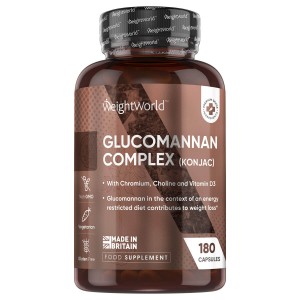What Is Glucomannan?
Glucomannan comes from the root of the konjac plant and is a beneficial soluble fibre that helps to suppress the appetite.
Glucomannan is used across the world in supplement form as a weight loss aid. When you take glucomannan in the correct quantities before a meal, it turns into a gel which is absorbed by your stomach. This leads to your stomach feeling fuller, ultimately curbing your appetite, and resulting in potential weight loss.
What Are Soluble Fibres?
Soluble fibres are a class of "complex" carbohydrates which are soluble in water. When mixed with any liquid, especially water, soluble fibres turn them into a thick gel. There are plenty of examples of such fibres, including fruit pectin which is commonly used to thicken jams and jellies, and xanthan gum that is used as an emulsifier making foods creamier. Glucomannan functions in the same way by trapping the water in your digestive tract.
By introducing more soluble fibre into your diet, such as that found in apples, oats and cherries, you can speed up the burning of unwanted fat, as the fibres can help to pull out cholesterol and excess hormones responsible for weight gain. We recommend that women consume 25g of fibre per day whilst men should aim to take 30g a day.
Soluble fibres are great bacteria foods (which earns soluble fibre the term prebiotic). Our gastrointestinal bacterias eagerly ferment soluble fibres, creating by-products, such as valuable nutrients.
Soluble fibres are found in foods such as:
- White bean extract and legumes
- Grains such as oats, rye, and barley
- Fruits such as plums/prunes, apples, pears, berries, and bananas
- Vegetables such as onions, artichokes (root vegetables/tubers are often high in soluble fibres)
- Seeds such as chia and psyllium
What Does Glucomannan Do?
Glucomannan works in the intestines and stomach by absorbing water to form a bulky fibre gel, which can help increase the feeling of fullness. Glucomannan can also decrease your absorption of cholesterol and sugar, which in turn helps to reduce your cholesterol levels.
Glucomannan, like other dietary fibre, is not only great for helping to alleviate constipation related issues by flushing out harmful toxins from your intestinal tract, but it can also help with decreasing the bad bacteria in your intestines, and consequently to increase the good bacteria count left behind. The probiotic effect of Konjac Glucomannan gives your body the little extra help it needs to maintain weight levels, and potentially help you to lose weight in the process.
Does Glucomannan Really Work?
Glucomannan differs from most other soluble fibres, as it’s exceptionally viscous, making it particularly effective for weight loss. Like other soluble fibres, glucomannan absorbs water in your stomach and contributes to feelings of fullness. In addition, it may promote reduced calorie intake and weight loss in other ways. A number of studies have shown that Glucomannan can contribute to modest weight loss in overweight people when regularly taken before a meal. It also works really well alongside a balanced diet, as is this case with other weight management methods too.
Health Benefits Of Glucomannan
Below are a few more major health benefits of glucomannan can help you to lead a healthier life:
Weight Loss
The Glucomannan is a dietary supplement often used during a caloric restriction phase to influence weight loss. To observe weight loss, you must maintain a calorie deficit over a sufficiently extended period. However, during this phase of restriction, you will find that you will have more and more trouble keeping up; especially because of increased levels of Ghrelin that gives rise to cravings. The rival hormone of Ghrelin is Leptin. The latter opposes feelings of hunger and helps increase levels of satiety. Taking Glucomannan promotes release of Leptin thereby promoting weight loss.
As a soluble fibre, glucomannan takes up space in your belly and promotes a feeling of satiety. This means that you feel satisfied for longer, reducing your overall food intake. It also delays the emptying of your stomach, resulting in increased satiety. Glucomannan also reduces the absorption of proteins and fats which can contribute to the prevention of fat synthesis.
In one 2007 study published in the British Journal of Nutrition, participants taking a glucomannan and psyllium husk combination supplement lost approximately 10 pounds in 16 weeks, compared to 1.7 pounds lost in the placebo group.
Constipation
Constipation is usually caused by a low-fibre diet, dehydration and lack of exercise. Glucomannan is widely considered as a natural laxative when taken in bulk. Therefore, its contribution favours easy bowel movement. When glucomannan is consumed, it works like a prebiotic in your system to promote the growth of healthy microorganisms in our intestine and promotes healthy bowel movements.
Helps To Reduce Blood Sugar Levels
As glucomannan delays the process of natural emptying of your stomach, this leads to a more gradual sugar absorption rate. When Konjac fibre is taken with conventional diabetes treatment techniques, it can help to improve blood glucose level, blood lipid profile, and systolic blood pressure in high-risk diabetic patients. Glucomannan also improves the effectiveness of conventional treatments for type 2 diabetes.
If you’re diabetic, it’s essential that you make glucomannan a part of your diet. If used as part of your regular diet, it can help lower cholesterol, blood pressure and balances blood sugar levels.
Works As A Natural Prebiotic
While probiotic foods are essential for better gut health and general wellbeing, prebiotics like glucomannan is what actually nourishes probiotics. As a component of non-digestible fibre, glucomannan passes through the upper part of your gastrointestinal tract and remains undigested, as your body fails to break it down completely. Once these prebiotics reach your colon, they are fermented by the intestinal microflora, which then forms the probiotics.
With an improved intake of prebiotics, your risk of cardiovascular disease, obesity, weight gain, inflammation and autoimmune reactions decreases. This also leads to healthier cholesterol levels, better gut health, improved digestion, lower stress response, higher immune function and better hormone balance.
Anti-Ageing
In a study, it was found that Glucomannan delays arteriosclerosis, cell ageing, and brain deterioration. Glucomannan proves to be amazing for your skin, as it promotes healthy cells to help you look and feel younger.
How To Add Glucomannan To Your Diet?
Glucomannan is very easy to take, and creating a glucomannan diet plan will make the process even easier. Just follow these simple steps:
Step 1 - If you’re thinking about using glucomannan in powder form, all you need to do is add 1 gram to your favourite food or drink, 3 times a day before each main meal. Glucomannan powder mixes well in foods such as oatmeal, yogurt and sauces, as well as in a variety of hot and cold beverages such as herbal teas or smoothies or just plain water.
Step 2 - There are a variety of food products which contain glucomannan, such as shirataki noodles, which can be used with your favourite pasta sauce and veggies. Glucomannan can also be found in candies and chews at health food stores.
Step 3 - Whichever form of glucomannan you decide to take, we recommend that it’s taken with at least 8 ounces of water per serving
Step 4 - Always take glucomannan at least 15 minutes before your regular meal, to help prevent alterations in your blood sugar levels and avoid overeating.
How To Use It?
The amount of glucomannan you should take will depend on what you hope to achieve.
- The amount of glucomannan shown to be effective as a laxative is 3–4 grams per day.
- Effective amounts for lowering blood cholesterol have been 4–13 grams per day.
- For controlling blood sugar, 500–700 mg of glucomannan per 100 calories in the diet has been used successfully in controlled research.
- For weight loss, 1 to 3 grams before each meal has been effective.
- When using glucomannan and other dietary fibre supplements, it’s best to start out with a small amount and increase gradually.
- It’s been recommended to drink at least 8 ounces of water each time any bulk-forming laxative, including glucomannan, is taken.
In Conclusion...
Glucomannan has become popular for a variety of different reasons, notably for its potential ability to aid with weight loss.You must also follow a healthy lifestyle, including a diet based on whole foods and regular exercise, in order to have help from an additional element like Glucomannan to lose weight
As demonstrated in this article, glucomannan can be used for a whole host of reasons, so even if you aren't looking to lose any weight, it may still bring you some astonishing bodily benefits.




